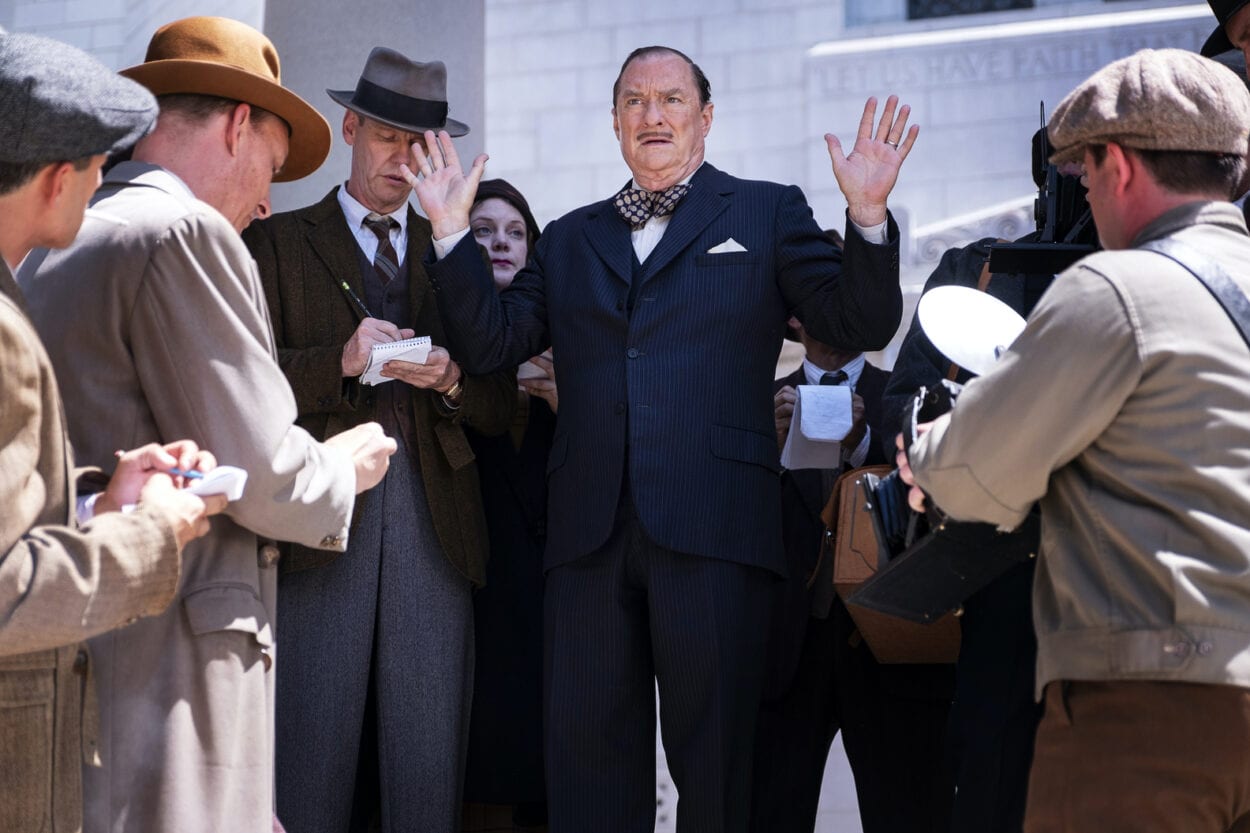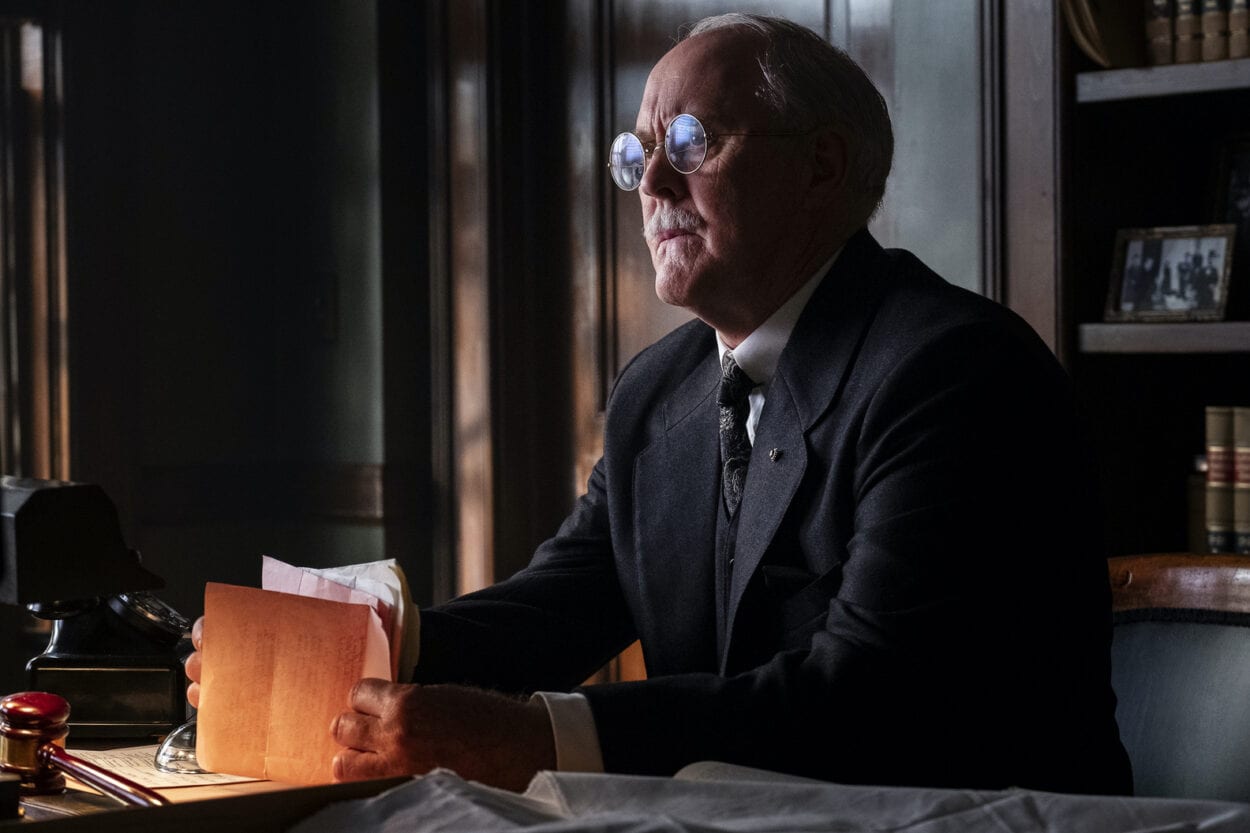Perry Mason S1E3 begins with Maynard Barnes (Stephen Root) putting correspondence between Emily Dodson (Gayle Rankin) and George Gannon (Aaron Stanford) on a board to display to the press. This scene is intercut with one of E.B., who is also talking to the press from the point of view of the defense. Things have ramped up since the end of S1E2 in terms of the media attention being shown to the Dodson case, as it is now the salacious story of a mother killing her own baby (or, well, at least many are thinking of it like that).
E.B. wants Matt close by Emily’s side for her bail hearing (and says that the judge is an old friend), but Matt explodes at his wife during this conference, asking her if she had sex with George in their bed and so on before accusing her of being responsible for Charlie’s death. It would seem as though that is not his ultimate position, but rather that he is wavering throughout the episode. This makes sense, of course, given that he has learned that his wife was having an affair, and all of the evidence points to at least the man with whom she was having an affair having been involved in Charlie’s kidnapping.
Then there is the correspondence. Barnes says that it includes plotting between George and Emily with regards to the kidnapping, but Perry Mason S1E3 does not really establish whether this is true or not. E.B., for example, doesn’t seem to take the charge all that seriously when he is talking to the press, and this seems noteworthy insofar as these letters are the ones that Perry found in S1E2—so presumably E.B. read them before handing them over, right? Maybe not…

Should they have turned these letters over to the authorities? Well, it cleared Matt of the murder charge, but at the cost of shifting it onto Emily. Della (Juliet Rylance) questions the move in a conversation with Mason in S1E3 and suggests that a subtle (or perhaps not so subtle) misogyny is at play in the way that people are inferring that since Emily was having an affair she must also be guilty of kidnapping/murder.
It does indeed seem to be true that people are making that inference all over the place in Perry Mason S1E3, and this should lead us to think about the relation or lack thereof between character and crime. Of course there is some relationship, but as I pointed out in discussing S1E2, the question of what behavior is “degenerate” and what isn’t is a highly fraught one. Further, we need to recognize (as I believe most people would if you asked them the question at the abstract level) that the issue of the morality of a person is not a zero-sum game. It’s not all or nothing. Most, if not all, of us are flawed in some way. And isn’t that thought in fact central to Christian faith?
God Is Gone
The Radiant Assembly of God features more prominently in S1E3 than it had in earlier episodes of Perry Mason, and I am intrigued to see where this storyline is going. Sister Alice went off-script in S1E2 during the service just before Emily was arrested, and her mother (Lili Taylor) apparently gave her a talking to about it. This raises questions about the power structure of the church and whether perhaps those in positions of power higher up than Sister Alice’s may be involved in some nefarious goings-on. And there is also that posting pertaining to child adoption that Mason notices when he visits the church—could this be related to the kidnapping in some way?
Sister Alice herself, I think, is a true believer and not someone who was involved with what happened to Charlie. She visits Emily in prison to pray with her and insists to her that she isn’t guilty if she didn’t directly act in ways that led to Charlie’s death. It will be interesting to see how much Sister Alice’s story tracks with that of Sister Aimee, and/or to what extent other aspects of the Radiant Assembly allude to her life or to Angelus Temple.
But the more interesting question to me is what the correct Christian response would be if Emily were guilty. Alice’s mother insists that the church has to distance itself from Emily, and this way of thinking about morality and religion is something we are all too familiar with. But if you go back to Jesus, isn’t Christianity supposed to be about loving not only your neighbor but your enemy? Isn’t it supposed to be about forgiveness? Shouldn’t the door to salvation be open to the child murderer?
It’s clear that at some point, Christians by and large decided that the answer is no, and that’s all too human. The wicked are to be cast out of the community of the faithful, rather than offered a chance at redemption. Of course, this does not hold across the board, but most people seem to think that some crimes are so heinous as to put the offender beyond the pale, and those aspects of Christianity which would question this don’t tend to be the ones people emphasize.
Perry Mason S1E3 ends with a performance at the Assembly featuring Sister Alice. I am not sure precisely what the story is supposed to be beyond the fact that it involves a boat called the S.S. HELLSUPONUS being toppled by another boat called the S.S. REEL BLESSED.
Regardless, the more interesting action occurs when Sister Alice has a seizure. The Assembly acts as though she is OK and even tries to celebrate what is happening as she lies in the boat seizing, but we have to wonder whether she has epilepsy or something like that. How does this factor in? I half-expected it to be more a part of the show, as though this evidenced a special connection to God, but instead it seems that while Sister Alice herself believes that it does, her mother and the others are skeptical. Or is that appearance of skepticism only more specifically in relation to the fact that after Alice comes to she says that God told her she is going to resurrect little Charlie Dodson?
Sometimes I Think This Is No Longer My World
E.B. presents some concerning behavior throughout S1E3. The blood in his sink and the way he stares off into space absently even as Della arrives to his place may be the most straightforward signs that something is wrong, but I’m more interested in his interactions with those he seems to think are old friends.

He says this first about the judge for Emily’s bail hearing (Matt Frewer), but it certainly doesn’t seem like there is any personal connection to exploit given what happens in the courtroom. Then later, after learning that Herman Baggerly will no longer be funding Emily’s defense, E.B. suggests that his old law partner owes him one, when the truth would seem to be quite the contrary. This all raises two questions. One is what is going on with E.B. at a mental/physical level. The other is what happened in the past that Maynard Barnes might discover about him, and just how bad that might be.
What Kind of Accountant Burns Money?
Perry spends the bulk of S1E3 (give or take a date) investigating George Gannon. In the process, he meets Drake, noting that all of the officer’s other reports are much more detailed than his report on the shooting at the apartment. Mason knows that Drake has been pressured to change his report. Ultimately, Drake’s conscience gets to him, but I think this has less to do with Perry and more to do with how Ennis has been applying pressure to him, along with what he’s been seeing in the press. Regardless, he finally gives Perry the clue to discover that George was murdered—the dentures he found. He also pretty much calls Perry a dummy for caring about truth and justice, somewhat echoing the way his wife had urged him not to get involved and focus on his family instead. I hope nothing bad happens to Drake.
As Mason investigates, we learn that George was, by all accounts, a pretty boring guy. He worked as an accountant at a casino, sure, but didn’t seem to make much of an impression on the owner Al (Andrew Divoff) until he quit with a rant about the place being a den of iniquity. Choir members at the Radiant Assembly apparently called him wallpaper.
So just what exactly was George’s deal? If he was killed, why exactly? And why was there money in the fireplace? If the point were to plant it to implicate him, I don’t really see how the burning of the money would connect to that.
As such, Perry Mason S1E3 leaves us still only with answers that open further questions. This is not a black-and-white case, as E.B. insists, but one that is riddled with nuance all the way through. We may know that Ennis was involved in the kidnapping of Charlie, and we have further learned that he collects money from a brothel where a certain Mr. Wu isn’t happy about the news regarding George, but how this all hangs together feels harder to see than ever.
In this way, S1E3 had me feeling like I was watching Perry Mason much more than the previous episodes, as I think back to my experience of the previous incarnations of the character. This is the kind of complicated story I was expecting, and I can’t wait to see how Mason cracks it and if I can get there before him.


I could not wait for the new Perry Mason to come on and I am disappointed. First Earl Stanley Gardner would roll over in his grave for this has proved nothing like our dear Perry Mason, then it should be in the 20th century.
What’s with the trolley cars is it in San Francisco?It took me to the 3rd episode to figure out who was who. I know some of the actors but I never heard of the others such as Paul Drake. I guess he’s the black police officer, who knows
Not at all happy with this show but I will still watch it and maybe it will come together.
Janice Bennett
I think it’s true that the show doesn’t feel much like Perry Mason. There are some elements that do, though. Trolley cars used to be all over the place, and apparently at the time the show is set (1931) Los Angeles had the largest system in the world. Paul Drake is a classic Perry Mason character, though he was white in the Burr series. I think it’s interesting what they have chosen to do here with the racial dynamics. The whole thing has a bit of the feel of a prequel and is very noir. I don’t know. I’ve been enjoying it, anyway.